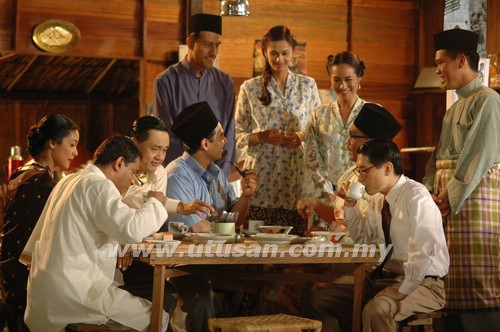Aug 31, tomorrow, Malaysia will be 60. theSun got a film scholar and best selling author Malaysian Cinema in a Bottle to select 10 films and documentary that showcase the history of our country.
Headline: Capturing The Malaysian Spirit
By Bissme S
Tomorrow we will be celebrating our 60th Independence Day. In honour of this momentous event, we asked Hassan Muthalib, the renowned film scholar and author of Malaysian Cinema in a Bottle to pick 10 local films and documentaries that showcase our Malaysian spirit. Below are his selections and why they are a reflection of our independence:
*MERDEKA MISSION
Year: 1956
Director: Unknown
Hassan says this 26-minute documentary, produced by Malayan Film (the precursor of Filem Negara), looks at how Malaysia’s first prime minister Tunku Abdul Rahman negotiated our independence from the British.
“There are so many meanings behind the images in this documentary. The editor did a great job putting them together. There were many closeup shots of Tunku and these gave the impression that he was well received by the British.
“There’s also an image of Tunku sitting at the same table with [the British] having dinner. That shot is enough to tell us that we are now equal to the colonials.
“When Tunku returned home from his London meeting, he received a garland from his supporters. The garland tells you that the non-Malays [also supported] him.
“He was driven around in an open-hood car with thousands (lining] both sides of the road to welcome him. [He received] a
hero’s welcome for getting our Merdeka.”
---------------------------------------------------------------------
*PENDEKAR BUJANG LAPOK
Year: 1959
Director: P. Ramlee
Made two years after our Independence, Hassan says this Ramlee classic asked the pivotal question: Are we really
independent?
“At that time, a lot of Malays could not read and write. Subtlely, with a touch of humour, Ramlee shows that our colonial mentality has not disappeared, and that education is going to liberate us.”
---------------------------------------------------------------------
*SENIMAN BUJANG LAPOK
Year: 1961
Director: P. Ramlee
Hassan says Ramlee, who had never gone to film school, cleverly used film subtext to tell his stories.
“In this movie, Ramlee shows how the mentality of successful Malays has not changed even even after Independence. They are so status conscious that they look down on the working class Malays.
“Also, women are bold in his films. You see Saloma’s character in this film giving her lover money, and you have Normadiah’s
character daringly expressing her love for a man."
-----------------------------------------------------------------
*SEMAN
Year: 1987
Director: Mansor Puteh
Hassan says this is a modernist feature that tells the story of a young man who wants to write better scripts and create better
movies. But his films are not accepted, so he gives up. This, to me, is an expression of how director Mansor feels that trying to be a better filmmaker in Malaysia is an uphill task that gets you nowhere.
-----------------------------------------------------------------------
* LELAKI KOMUNIS TERAKHIR
Year: 2006
Director: Amir Muhammad
This documentary was earlier cleared for screening but eventually was banned after questions were raised why the communists should be highlighted in a film. Hassan explains that the communists were the first to fight for independence as they wanted the British out of the country and to stop exploiting our economy.
“Amir focuses on Chin Peng, the leader of the Malayan Communist Party. He traced the place where Chin Peng was born to the last place he [went] into hiding. Hassan says Amir told the story through interviews he had with the people at these places who knew about Chin Peng, the communists, and their daily life.
“Indirectly, one gets the impression that the people, especially the youngsters, have forgotten about the communists.”
-----------------------------------------------------------------------
*1957: HATI MALAYA
Year: 2007
Director: Shuhaimi Baba
This film, says Hassan, is told from the perspective of a group of young people who want to produce a book
on the country’s independence.
“Today, some people say that we were never colonised in the first place but if we were never colonised, where does the word Merdeka’ come from?”
-----------------------------------------------------------------------------
* BUDAK KELANTAN
Year: 2008
Director: Wan Azli Wan Yusof
Hassan says in this film, the director questions how Malay youths have lost their way. It looks at two youths from Kelantan who come to Kuala Lumpur and end up involved in gangsterism. They kidnap women and sell them into prostitution.
“The film was shot with a hand-held camera. The shaky scenes show the world is full of tension.”
-------------------------------------------------------------------------
*29 FEBRUARI
Year: 2012
Director: Edry Abdul Halim
Hassan says this fantasy story, about a man who only grows old every four years, allows us to see
the history of our country through the character’s eyes.
“The visual effects are fantastic. Archive images from the past are well used in the film.”
------------------------------------------------------------------------
*ROAD TO NATIONHOOD
Year: 2016
Director: Ahmad Yazid
This documentary film traces Malaysia’s formation, using archive footage that has never been broadcast on television, says
Hassan.
“It uses cutting-edge visual effects to highlight events leading up to Merdeka and eventually, to the birth of Malaysia.”
----------------------------------------------------------------------------
* OLA BOLA
Year: 2016
Director: Chiu Keng Guan
Based loosely on the true efforts of the Malaysian national football team which successfully qualified for the 1980 Summer Olympics, this movie highlights the rekindling of the Malaysian spirit.
Hassan says: “The director shows a TV journalist who wants to leave the country, but in the end, she did not go. The film also shows how a sporting event can make us forget our differences and come together as Malaysians."










